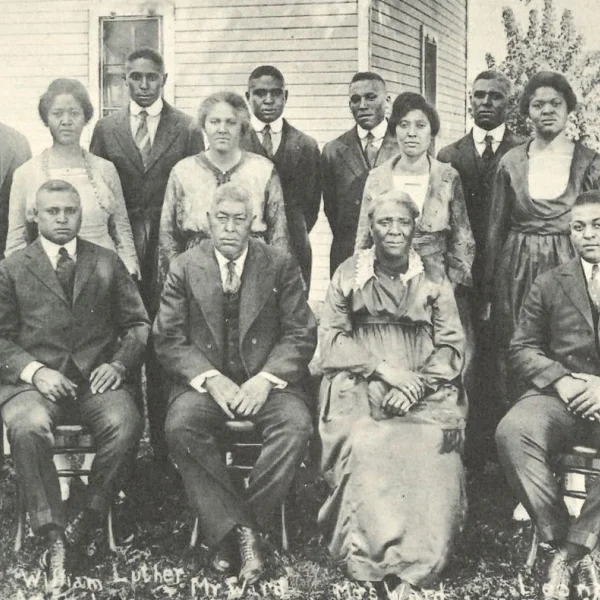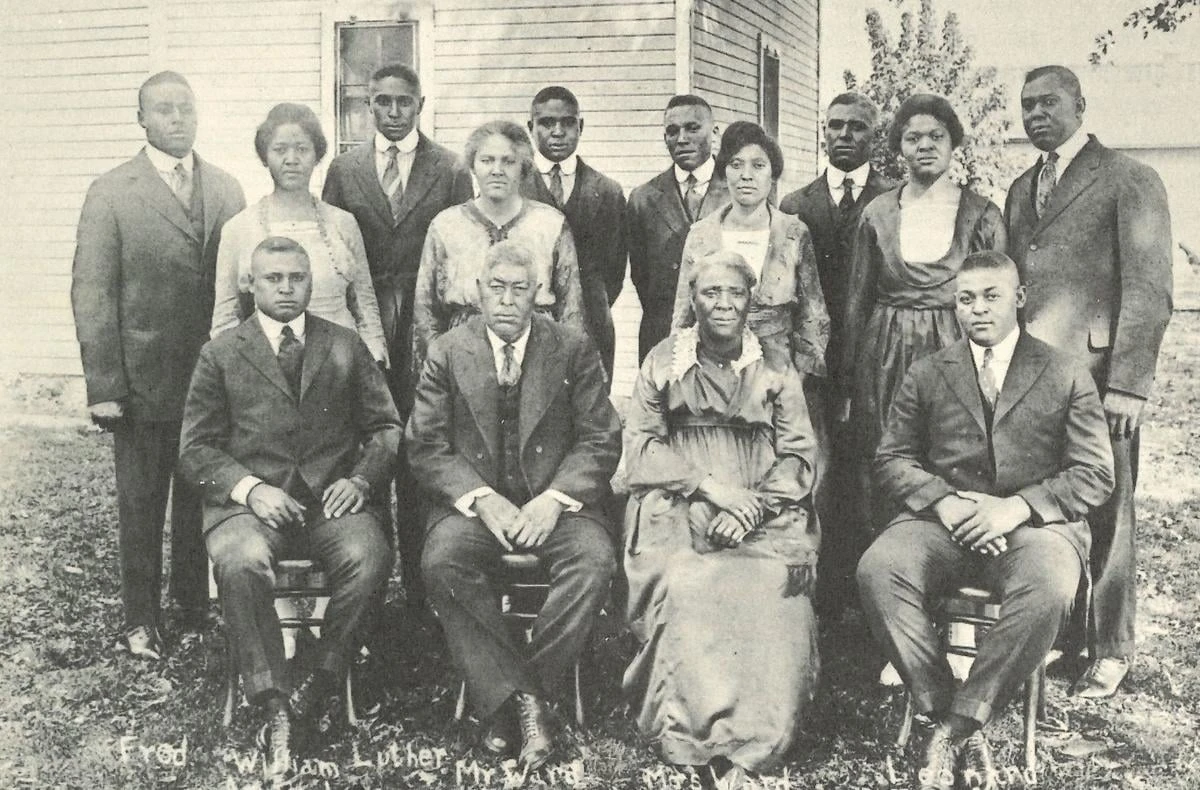McLean County farmland has always had a relatively high rate of tenancy—from the earliest years of the county’s establishment to the present. One of the more remarkable landowner-tenant relationships in county history was that of U.S. Vice President Charles W. Fairbanks and African-American tenant farmer Jesse Robert Ward.
Fairbanks, a U.S. senator from Indiana when he became Theodore Roosevelt’s running mate in the 1904 presidential election, owned 2,000-plus acres in Bellflower Township, in the McLean County’s southeastern corner.
Ward was born into slavery in 1857 in Grand Lake, Arkansas. After being freed, he made his way to Bellflower Township where he found a new life as one of Fairbanks’ tenant farmers. On a farmstead three miles east of the Village of Bellflower, Jesse and his wife Mary raised twelve children to adulthood—four daughters and eight sons.
Despite the enormous chasm of opportunities and life experiences between the white privileged politician and the black tenant farmer, the two men and their families developed an abiding respect and friendship toward each other. In fact, Fairbanks, who maintained a summer home several miles south of the Bellflower, was said to be a frequent visitor to the Ward home.
By 1896, the year Fairbanks vaulted into national prominence after delivering the keynote address at the Republican National Convention, he and his two brothers, William D. and Luther N., owned 2,300 acres in McLean County; another 300 or so acres in adjacent DeWitt and Piatt counties; as well as expansive holdings elsewhere in Illinois in Indiana.
Jesse Ward, notwithstanding his humble beginnings, maintained one of the larger private libraries in this stretch of Central Illinois. “If you want something, learn how to make it yourself,” was one of “Father” Wards’ practical life-lessons. Accordingly, several Ward sons were credited with the owning and operating the first steam engine among their neighbors. The Wards also introduced the area’s first riding plow, with local farm folk referring to the new-fangled, byzantine-looking implement as a “monstrosity.”
Three Ward boys graduated from the Berry School of Horsemanship in Pleasant Hill, Ohio. And much like steam power, several brothers became adept at harnessing electricity. “Their carbide light system was not so good but their Delco light plant was so successful and the boys studied so much, that they were electricians and wired houses all over Central Illinois,” noted a profile of Luther Ward, one of Jesse’s sons.
Much like the two family patriarchs, the Fairbanks and Ward children were friends. One story holds that when Charles Fairbanks’ son Warren was preparing to attend law school, efforts were made to have Ward’s eldest son Henry accompany him and perhaps earn a law degree as well.
“Mother” Ward put a stop to those plans, citing several Bible passages chapter and verse, such as Luke 11:52: “Woe unto you, lawyers! for ye have taken away the key of knowledge: ye entered not in yourselves, and them that were entering in ye hindered.” Mary Ward, according to a history of Piatt County, declared that, “none of her children should be standing in the courtroom defending the law when they should be defending righteousness.”
Beautiful Bellflower Township is host of this year’s Barn Keepers self-guided Barn Tour, Sat., Sept. 8. Tickets, $20 per carload, $15 for Barn Keepers members, are available that day at the Bellflower Community Center, 9 am to 2 pm. Tour participants are free to visit any of the eleven featured farmsteads and barns in any order and pace of their own choosing.
The ticket price includes a booklet featuring a map to find one’s way around the township and write-ups on each stop—the history of each barn and the family that farms their today. There are also brief historical sketches on Charles Fairbanks and the Ward family.
The Barn Tour, a popular early autumn tradition now in its thirteenth year, is sponsored by Barn Keepers, a McLean County-based not-for-profit group dedicated to the preservation and restoration of area barns.
Back in 1913, more than 2,000 acres of Charles Fairbanks’ McLean County land, including tracts of 367 and 341 acres, were transferred to his son Richard M.
The following year, 1914, bothers Joe and Jesse, Jr. Ward helped lead Bellflower High School to the McLean County Basketball Tournament title. Six years later, in 1920, Joe attended Illinois State Normal University, becoming the first African American on the school’s basketball team. He also earned respect throughout Central Illinois as a high school sports official, a role he embraced for a quarter century or longer
Charles Fairbanks died in 1918, but the Wards continued to live on and farm Fairbanks estate land. By 1927, the family was responsible for 1,200 acres. ”They are welcome anywhere they are known,” noted The Pantagraph at the time. “Neighbors like to exchange work with them. They expect little and give generously of their time and work.”
On January 2, 1951, a tragic farmhouse fire at the Ward place took the lives of one of Jesse’s son Joe and Joe’s sister Cora. It’s believed Luther G. Ward was the last of the immediate family to live in the Bellflower area. He passed away in the fall of 1975 at a hospital in nearby Gibson City.
Fairbanks land was sold off in stages in the latter half of the 20th century. In late September 1962, for instance, George Holder of Bloomington and Walter Jiles of LeRoy purchased 673 acres for $343,786 from Peoples Bank of Bloomington, which was acting as trustee for the late Mary A. Fairbanks, daughter of the vice president.
On Sept. 22, 1907, during his vice presidency, Fairbanks (the namesake of the Alaskan city, by the way), visited Bloomington for the laying of the cornerstone for the YMCA building once located at the southeast corner of East and Washington streets (today, the site is a municipal surface parking lot). “Mr. Fairbanks is not the ‘iceberg’ the cartoonists and paragraphers [that is, reporters] of the country have made the people believe him,” observed The Pantagraph. “He appears energetic, virile, full-blooded—the very opposite of the ‘apostle of coldness.’”
Although a stalwart Republican paper, The Pantagraph couldn’t help but have some light-hearted fun at the expense of the vice president. “Mr. Fairbanks is also somewhat bald-headed and carefully combs what hair the ravaging tooth of time has left him so as to conceal this fact as much as possible,” continued the coverage. “Still, that shouldn’t be held against him.”

